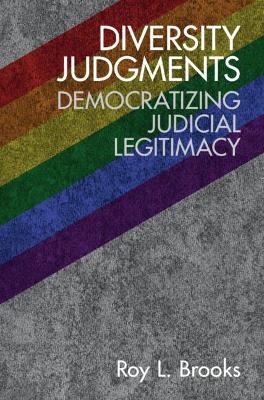
Diversity Judgments
Cambridge University Press (Verlag)
978-1-108-42432-5 (ISBN)
The US Supreme Court's legitimacy-its diminishing integrity and contribution to the good of society-is being questioned today like no other time in recent memory. Criticisms reflect the perspectives of both 'insiders' (straight white males) and 'outsiders' (mainly people of color, women, and the LGBTQ community). Neither perspective digs deep enough to get at the root of the Court's legitimacy problem, which is one of process. The Court's process of decision-making is antiquated and out of sync with a society that looks and thinks nothing like the America of the eighteenth century, when the process was first implemented. The current process marginalizes many Americans who have a right to feel disenfranchised. Leading scholar of jurisprudence Roy L. Brooks demonstrates how the Court can modernize and democratize its deliberative process, to be more inclusive of the values and life experiences of Americans who are not straight white males.
Roy L. Brooks is Warren Distinguished Professor of Law at the University of San Diego. He is the recipient of five book awards and the author of more than twenty books, including The Racial Glass Ceiling: Subordination in American Law and Culture (2017), Racial Justice in the Age of Obama (2009), and Atonement and Forgiveness: A New Model for Black Reparations (2004).
Preface; Acknowledgments; Introduction: the framework; Part I. Asians Americans: 1. Matal v. Tam (trademarking racial slurs); 2. Lau v. Nichols (bilingual education); Part II. African Americans: 3. Brown v. Board of Education (single race schools); 4. Griggs v. Duke Power (employment discrimination); 5. District of Columbia v. Heller (the right to keep and bear arms); Part III. Women: 6. Roe v. Wade (reproductive rights); 7. United States v. Virginia (single sex colleges); 8. United States v. Morrison (violence against women); 9. Kulko v. Superior Court (child custody or support); Part IV. Latinx: 10. Hernandez v. Texas (equal protection); 11. San Antonio Indep. Sch. Dist. v. Rodriguez (school financing); 12. Plyler v. Doe (educating undocumented minors); Part V. Native Americans: 13. Adoptive couple v. baby girl (Indian adoption); Part VI. LGBTQ: 14. Obergefell v. Hodges (single-sex marriages); 15. Bostock v. Clayton County (employment discrimination); Part VII. Intersectionality: 16. EEOC v. Catastrophe Mgt. Solutions Co. (Dreadlocks); 17. Kelo v. City of New London (eminent domain); Part VIII. Outsiders v. Outsiders: 18. SFFA v. Harvard (affirmative action); Part IX. White males: 19. McDonald v. Santa Fe Trail Trans. Co. (employment discrimination); 20. City of Atlanta v. Rolfe (law enforcement); Part X. Situational Outsiders: 21. Gideon v. Wainwright (right to counsel); 22. Martin v. City of Boise (the homeless); 23. Citizens United v. FEC (campaign financing); 24. Trump v. Hawaii (Middle East migrants); Index.
| Erscheinungsdatum | 09.03.2022 |
|---|---|
| Zusatzinfo | Worked examples or Exercises |
| Verlagsort | Cambridge |
| Sprache | englisch |
| Maße | 160 x 235 mm |
| Gewicht | 1060 g |
| Themenwelt | Geisteswissenschaften ► Geschichte ► Regional- / Ländergeschichte |
| Recht / Steuern ► Allgemeines / Lexika | |
| Recht / Steuern ► EU / Internationales Recht | |
| Sozialwissenschaften ► Politik / Verwaltung | |
| ISBN-10 | 1-108-42432-5 / 1108424325 |
| ISBN-13 | 978-1-108-42432-5 / 9781108424325 |
| Zustand | Neuware |
| Haben Sie eine Frage zum Produkt? |
aus dem Bereich


